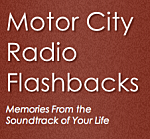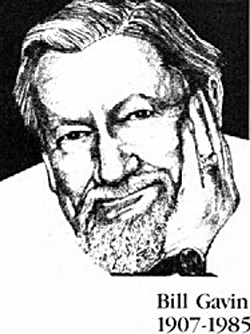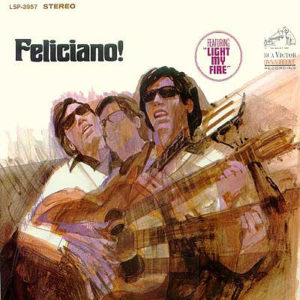 From the MCRFB NEWS archive: 1963
From the MCRFB NEWS archive: 1963
The Bill Gavin Newsletter March 30, 1963
Radio Management Policy Dictates How DJ Ultimately Swings
From the Desk of Bill Gavin Billboard Contributing Editor
MANAGEMENT AND THE DISK JOCKEY: Last week we had things to say about what makes a good disk jockey. We said very little about the problems and limitations surrounding the deejay, curbing his freedom of action. The circumscribed area within whose boundaries the disk jockey exercises his talents is known as “station policy.” This is simply another way of saying “what management wants.”
 Station policy controls the kind of music to be played, the range of disk jockey discretion in programming his own show, the amount of humor he may-or must-use, the handling of time, temperature and weather announcements, the use of production gimmicks, the frequency of call letter and personal name mention, and so on. As most of our readers know quite well, these requirements vary considerably from one station to another.
Station policy controls the kind of music to be played, the range of disk jockey discretion in programming his own show, the amount of humor he may-or must-use, the handling of time, temperature and weather announcements, the use of production gimmicks, the frequency of call letter and personal name mention, and so on. As most of our readers know quite well, these requirements vary considerably from one station to another.
In the “early” days (pre-1950) of the name disk jockey, he was pretty much his own boss. The main considerations were his ratings and the amount of revenue they attracted. He selected his own music and was expected to be a specialist in the field. The man preceding or following him often played a different kind of music. Each disk jockey set his own music policy, within very broad limitations.
Top 40 changed that. One by one, the big name disk jockeys found it impossible to hold their ratings in the face of a solid challenge from a pop station whose music was dependably the same day and night. The concentrated power of the top hits was too much for stations that had no over-all music control.
MUCH THAT WAS CREATIVE was lost to modern radio with the passing of the big name disk jockey. Much that was stereotyped – almost ritualistic, and certainly sterile-replaced it. But this was apparently what the people wanted. The top 40 disk jockeys was almost a robot, with little to do besides time, temperature, the chart number of the record, and an occasional pick “destined for future popularity.”
As top 40 outgrew its early childhood, a handful of progressive program directors began to realize that while the mass audience wanted the top hits, they also preferred having them presented by human beings rather than automatons. The disk jockey began to re-emerge as a vital factor in program appeal.
Little stations and big ones are now trying to solve the problem of how to adapt the personality disk jockey to a carefully controlled music policy. There is endless experimenting going on.
Disk jockeys are encouraged to be “personalities” – to sparkle with clever sayings. Some disk jockeys have their own private gag files. A few stations have libraries of wit and humor, from which the air men are expected to draw. There are syndicated gag services in circulation. Some stations, I’m told, employ feature writers to supply disk jockeys with clever material. Apparently the humor factor bulks large today in the thinking of station managers.
The function of the disk jockey in building his own show is, of course, much more restricted on top 40 than on “better music” stations. But even in the latter, we find a growing trend toward a “must play” list of singles, which have to be incorporated with some frequency into every disk jockey show.
AMONG TOP 40 STATIONS, opinion seems divided as to requiring the disk jockey to prepare his show in advance. Some feel that he operates better through the exercise of spontaneous choice as he goes along. Others believe that a planned show is more likely to be smooth and well balanced. Among smaller stations, particularly, the requirement of writing out in advance the order of records to be played compensates somewhat for comparative inexperience of the staff. In a few cases -successful, I might add – the music director himself programs every disk jockey’s show, and deviations are permitted only in exceptional cases.
Even in the early days of top 40, management noted one difficulty: Disk jockeys with no responsibility for picking the records were losing contact with the music world. As they lost touch, they also lost interest, and that’s just how they sounded on the air. To correct this shortcoming, many stations instituted the weekly staff meeting.
The music director plays a group of new releases for the assembled disk jockeys, who vote yes or no on each nomination. Only those sides receiving a big majority (two- thirds or more) could be included in the new playlist. The system is anathema to most promotion people, who would prefer to focus their efforts on a single arbiter rather than on a group. Weekly meetings may be cumbersome and inefficient, but they do give each disk jockey a sense of responsibility for the new music selected. END
___
(Information and news source: Billboard; March 30, 1963)
![]()


